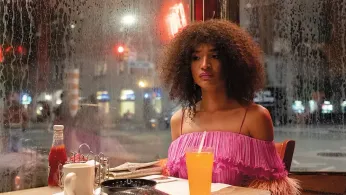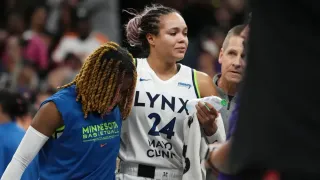
4 hours ago
'Pose' Star Indya Moore Calls Out Ryan Murphy Over Silence on Trans Rights
READ TIME: 3 MIN.
Ryan Murphy’s FX series Pose broke new ground in television by centering the experiences of Black and Latinx transgender people within New York City’s ballroom scene, launching the careers of several trans actors including Indya Moore. The show was celebrated for its authentic casting and storytelling, earning critical acclaim and contributing to greater visibility for transgender people in mainstream media . Murphy, as creator and executive producer, was widely praised for his role in bringing these stories to a wider audience .
On September 28, 2025, Indya Moore posted an impassioned video on Instagram, directly addressing Ryan Murphy’s silence regarding the ongoing attacks against transgender rights in the United States, particularly those exacerbated by policies and rhetoric associated with the Trump administration . Moore expressed disappointment, stating, “We really pissed you off that much?”—suggesting a sense of betrayal and abandonment by Murphy, who had previously positioned himself as an ally through his work on Pose .
Moore accused Murphy of “turning away from the trans community after profiting from our stories,” highlighting the gap between representation on screen and meaningful advocacy off screen . The actor’s remarks come at a time when transgender people in the U.S. face mounting legislative and social challenges, including proposed restrictions on healthcare, education, and public participation .
The Trump administration’s legacy includes numerous efforts to roll back protections for transgender people, from banning transgender service members in the military to attempts to restrict access to gender-affirming healthcare . Recent months have seen a resurgence of anti-transgender legislation at both the state and federal levels, with activists sounding the alarm about the erosion of hard-won rights .
Moore’s comments reflect widespread frustration in the LGBTQ+ community over the perceived lack of support from prominent figures who have previously benefited from association with transgender narratives. Many advocates argue that visibility alone is insufficient, and that those in positions of influence must use their platforms to actively counter anti-transgender rhetoric and policy .
Ryan Murphy, whose body of work has included numerous LGBTQ+-focused projects, has been lauded for increasing on-screen diversity. However, Moore’s critique underscores a growing demand for accountability and sustained engagement beyond representation. “It’s not enough to tell our stories,” Moore said. “We need you to stand with us when it matters most”—a sentiment echoed by advocates who call for solidarity in moments of crisis .
The entertainment industry’s relationship with LGBTQ+ communities is evolving, as more artists and creators are challenged to back up representation with concrete action—such as public statements, lobbying efforts, and financial support for advocacy organizations. Moore’s remarks have prompted renewed discussion about what it means to be a true ally in an era of escalating attacks on marginalized groups .
Moore’s video has resonated widely on social media, with many users expressing support and sharing their own frustrations over the lack of visible advocacy from Hollywood leaders. Some have pointed to similar criticisms leveled at other high-profile allies, noting a pattern of silence during critical moments for transgender rights .
LGBTQ+ organizations have called for a renewed commitment to advocacy, emphasizing the importance of leveraging cultural influence to effect real change. “Visibility must translate into action,” one advocate commented, urging those with power to intervene against harmful legislation and public discourse .
As the fight for transgender rights continues, the entertainment industry faces increasing scrutiny over its role in shaping public perception and policy. Moore’s challenge to Murphy serves as a reminder that representation, while vital, is only the first step in the broader struggle for equality and justice. The demand for meaningful allyship—rooted in advocacy, accountability, and solidarity—remains urgent as transgender people confront ongoing threats to their dignity and safety .
Moore’s message calls on Hollywood and its allies to recommit to the fight for trans rights, ensuring that the progress achieved through shows like Pose is not undermined by silence in the face of adversity. The conversation sparked by Moore’s remarks may well shape the future of LGBTQ+ advocacy in media and beyond .






